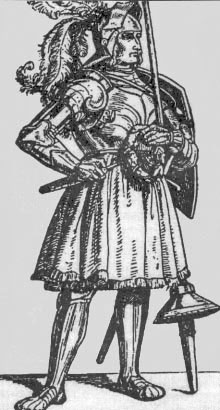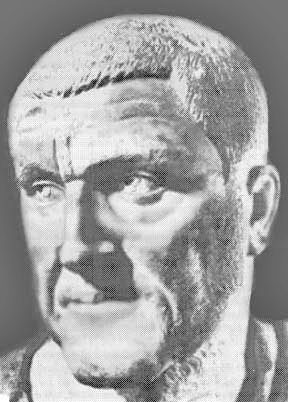Manlius, Marcus
In 387 B.C., when the Senone giants advanced on Rome, everyone fled the city except Marcus Manlius and about one hundred and twenty courageous youths who took up a position atop the Capitol hill. Using the steep slope to their advantage, Manlius and his small band were able for many days to withstand the giants' every assault. (See Rome vs Senone Giants)
Maximilian
Those who profess the Aryan theory hold that the Celtic race, particularly its Germanic branch, is vastly superior to all others. "Only white peoples, especially the Celtic, possess true courage, love of liberty and the other passions and virtues which distinguish great souls," proclaimed the German historian Christoph Meiners (1745-1810). Meiners is generally regarded as a founder of this racial theory.101 Julien-Joseph Virey (1775-1846), a disciple of Meiners, asks: "What would our world be without the Europeans? Powerful nations, a proud and indomitable race, immortal geniuses in the arts and the sciences, a happy civilization. The European, called by his high destiny to rule the world, which he knows how to illumine with his intelligence and subdue with his courage, is the highest expression of man and at the head of the human race. The others, wretched horde of barbarians, are, so to say, no more than its embryo."102 In other words, the true Aryans see themselves as "supermen," and they regard "all the other species of men (for there are four or five different kinds) to be naturally inferior to the whites."103 All these peoples who are not light of skin and blond they classify as "subhumans."
Where did such an idea come from?
In its earliest written form, the Aryan concept predates both Meiners and Virey. The historian S. H. Steinberg traced it back to the humanistic historiographers who lived during the reign of the Holy Roman Emperor Maximilian I (1493-1519). "It was these fore-fathers of our contemporary journalists who supplied the copy for Maximilian's anti-French propaganda," he writes. 'The French and, in fact, every other nation were, so they argued, inferior to the Germans because of the latter's pride of place in the pedigree of the Western nations: had they not for ancestors the Cimbri who made Rome tremble? ... Were the Germans of Maximilian not the sons and heirs of the Lombards who gave their name to Upper Italy, the Franks who established their rule over Gaul, the Angles and Saxons who made themselves masters of Britain?"104
 |
|
MAXIMILIAN, the giant Roman Emperor, dressed in his armor in this contemporary artist's sketch.
|
Steinberg thus found the Aryan idea embedded in the most ancient customs and culture of the German people. So, long before Aryanism came to be expressed on the written page, the Germans harbored the conviction that they were a superior people. This opinion apparently originated with the early German Cimbri people. We can easily see how such an idea caught on. For the gigantic Cimbri were supermen. They regarded themselves as supermen. They taught their children they were supermen, and their children taught their children they were descended from supermen, and so on and on.
Maximilian not only claimed direct descent from this ancient race of supermen, he was himself a bona fide superman. According to Henry Wysham Larder, he stood above eight feet tall,105 and was similarly endowed with the might of a giant. His father, the Emperor Frederick HI, also awed his viewers, for, declares Friedrich Heer, he was "physically ... a giant, of immense corpulence."106
While Frederick sat on the emperor's throne, his eldest son Maximilian reigned as "King of the Romans." When Frederick died in 1493, Maximilian began to exercise full imperial powers without going through the formality of an election, as had the other Habsburg rulers before him. The new, highly popular, thirty-four-year-old emperor "had all the qualities of a great ruler, except prudence and foresight," writes Bayard Taylor. "He was tall, finely-formed, with remarkably handsome features, clear blue eyes, and blond hair falling in ringlets upon his shoulders; he possessed great muscular strength, his body was developed by constant exercise and he was one of the boldest, bravest and most skilful knights of his day."107
But the giant's daring sometimes bordered on rashness—some described it as almost a madness—as when, for some examples, he "followed a bear to his den, and fought him there; when he entered the lion's cage, and cowed him down; and, above all, when he chased the chamois and the wild-goat up to the highest peaks of the Tyrolese Alps."108 In battle, Maximilian fought courageously. On many occasions, he proved himself to be a resourceful commander, too, with a mind "fertile in new devices and cunning modes of attack." He also asked nothing of his men he himself would not do. Historians say that he even forged his own armor and tempered his own sword. Perhaps to give his horse a rest, the giant emperor often marched at the head of his men on foot, carrying an oversized lance on his shoulder. He further won the admiration of his soldiers for his ability "not to be overcome by exertion and privation."109
Although Maximilian fought in many battles, he preferred, like all the Habsburgs, to make his territorial gains through marriages and treaties. He himself took Mary, the heiress of Charles, the duke of Burgundy, for his bride. Her dowry alone included the Netherlands and two provinces of France. This was such a tremendous acquisition that historians declare that from the year of this marriage, which took place in 1477, "the history of Habsburg was the history of Europe."110 In 1496, Maximilian prepared the way for the association of Spain with his empire by marrying his son Philip to Joanna. They became the parents of his grandson, the great Emperor Charles V.
Maximilian did much more than establish the House of Habs-burg as the major world power. Among his many other accomplishments was an effective system for law and order. A well-educated, well-read man, who became something of a poet in his later years, he also encouraged his subjects in the study of science, literature, and the arts.
Those who knew the emperor personally described him as an amiable man "of noble disposition and fine culture." But that said, Maximilian also believed the Aryan people possessed superior capabilities for government, social organization, and civilization, and he actively promoted that belief. It finally bore fruit in this century when the Aryan theory became the rage of Germany. The concept, after its long incubation, now commanded such a following that its adherents concluded the time had come to impose their "super race" on all the "subhumans" worldwide. It took World War II, and the tragic loss of millions of lives, to disprove the Aryan myth and check its advance. (See Jovian; Maximinus; also see Charlemagne)
Maximinus
Even after crushing them with humiliating defeats from which they never recovered, the Romans still were not quite done with the giants—for three of them later became their emperor.
Caius Julius Verus Maximinus, the first of these, rose from the lowest ranks of the Roman army to general; then the bloody assassin's sword suddenly made him the world's most powerful man.
Maximinus' humble birth occurred about A.D. 173, in Thrace (modern Bulgaria). The son of a Getae, he spent his earliest years as a shepherd, growing to a height of eight feet six inches. Yet for all his size and strength, he might have remained an obscure peasant had not the Emperor Septimius Severus, in 202, stopped in Thrace on his return from Asia. It so happened that the birthday of Severus' younger son, Geta, fell at this time, and to celebrate that event the emperor sponsored some games for the public. When the Romans challenged the locals to a contest—to determine who was the best —the Thracians chose Maximinus to represent them. Without much effort, he threw sixteen of the emperor's strongest warriors in succession. Impressed, the Romans immediately enlisted him in the army. Three days later, the new recruit, seeing the emperor pass on horseback at a full gallop, caught up with him and kept the pace. The race between the giant on foot and the emperor on his horse went on for some distance, but Maximinus continued to run along-side Septimius. Wonder struck, the emperor challenged him to enter another wrestling match. Though much fatigued, Maximinus agreed. With Septimius looking on, he threw seven more of the emperor's toughest men, one after another. For this feat the emperor awarded him a gold collar and promoted him to the emperor's guard.
 |
|
MAXIMINUS I in a Roman sculpture that art scholar Heinz Kahler describes as "an excellent rendering of an individual countenance, with, in his case, all its strange, wild, uncouthness." Kahler, The Art of Rome and Her Empire (New York: Greystone Press, 1965), p. 187.
|
As a soldier, Maximinus proved himself as brave as he was strong. He also displayed a remarkable leadership ability. Because of these qualities, he rose rapidly through all the military ranks to take command of armies and the government of provinces. The giant so impressed the young emperor Alexander Severus that he elevated him to the position of tribune, with the rank of senator. He also appointed him supreme commander of the Roman armies.
Herodian says Alexander's new commander not only stood to a huge height but possessed a frightening look. Statues of Maximinus and coins minted with his image bear this out. Another Roman his-torian, Julius Capitolinus, describes his hands as so large that he used the bracelet of his wife, Caecilia Pauline, for a thumb-ring. The shoes he wore also measured a foot longer than the footwear of other men. Besides the feats of strength already mentioned above, Maximinus reportedly could, with one blow of his fist, knock out a horse's teeth. On occasion he also demonstrated he could outpull a chariot team. Capitolinus says that he daily ate forty pounds of meat and usually drank six gallons of wine.
Such a fellow could not help but awe the soldiers under him. But Maximinus had much more going for him than that. He developed into an accomplished leader who knew how to gain from his men the greatest loyalty and effort. Because of his experience, Alexander placed him in charge of instructing all recruits in their military duties and training them for war. "By carrying out his assignments thoroughly and diligently," reports Herodian, "Maximinus won the affection of the soldiers. He not only taught them their duties; he also demonstrated personally to each man what he was to do. As a result, the recruits imitated his manliness and were both his pupils and his admirers. He won their devotion by giving them all kinds of gifts and rewards. Consequently, the recruits . .. praised the masculinity of Maximinus and despised Alexander as a mother's boy."111

